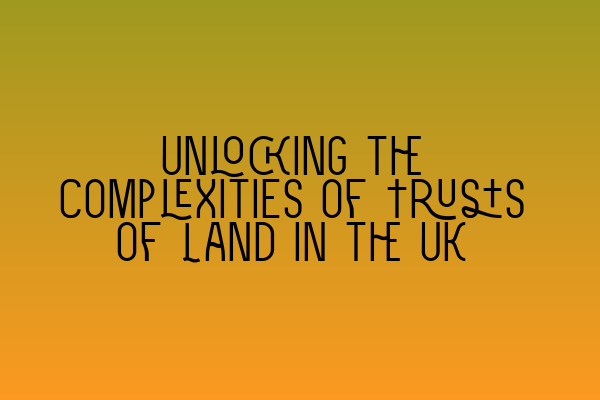Unlocking the Complexities of Trusts of Land in the UK
As a solicitor specializing in property law and land law, I often come across various complexities related to trusts of land in the UK. Trusts of land are legally binding arrangements where one or more individuals hold land or property for the benefit of others. These can be especially intricate and may require expert advice to navigate through the legalities involved. In this blog post, I aim to shed light on the topic and provide a comprehensive understanding of trusts of land.
To begin with, it’s essential to grasp the concept of a trust. A trust is a legal framework that allows assets to be held and managed for the benefit of beneficiaries. In the context of land, a trust of land arises when a property is held by one or more trustees for the benefit of one or more beneficiaries.
There are various types of trusts of land in the UK, including express trusts, resulting trusts, and constructive trusts. Each has its own set of rules and requirements that must be followed when establishing and managing them. These trusts can arise from a variety of situations, such as family arrangements, business partnerships, or even misunderstandings regarding the ownership of property.
One common form of trust of land is the express trust. This is a trust that has been expressly created by the settlor, who is the individual transferring the property into the trust. The settlor will outline the terms and conditions of the trust, specifying who the trustees are and who the beneficiaries will be. It’s important to note that the terms of an express trust must be in writing to be valid.
On the other hand, resulting trusts and constructive trusts arise in situations where the legal owner of the property holds it on trust for someone else. Resulting trusts typically arise when a property is purchased in one person’s name but is intended for the benefit of another. Constructive trusts, on the other hand, arise when a court imposes a trust to prevent unjust enrichment or to correct a wrongdoing.
Understanding the complex legalities of trusts of land requires a solid grasp of case law and legislation. The Law of Property Act 1925, the Trusts of Land and Appointment of Trustees Act 1996, and various other statutes and case precedents guide the formation, management, and resolution of disputes related to trusts of land.
As with any legal matter, seeking expert advice is crucial when dealing with trusts of land. A solicitor specializing in property law and land law can ensure that all legal requirements are met and can provide guidance throughout the process. At SQE Property Law & Land Law, we have an experienced team of solicitors who can offer tailored advice and expertise to help you navigate trusts of land law.
Moreover, if you are preparing for the SQE 1 or SQE 2 exams, it is crucial to have a thorough understanding of trusts of land. The SQE exams test your knowledge and comprehension of various legal areas, including property law. To enhance your preparation, consider taking advantage of SQE 1 and SQE 2 preparation courses offered by SQE Property Law & Land Law. These courses will equip you with the necessary knowledge and skills to excel in the exams.
To complement your studying efforts, I recommend practicing with SQE 1 practice exam questions and SQE 1 practice mocks FLK1 FLK2. These resources provide real-life scenarios that simulate the SQE exams, allowing you to familiarize yourself with the format and content of the actual exam. By practicing with these materials, you can identify areas that require additional focus and improve your overall performance.
For information regarding the SRA SQE exam dates, visit the official SQE 1 and SQE 2 exam dates page on the SQE Property Law & Land Law website. Staying updated on the exam schedule will help you plan your preparation effectively and ensure you are well-prepared for the exams.
In conclusion, trusts of land in the UK can be a complex legal area that requires careful consideration and expert advice. Understanding the different types of trusts and the legal framework governing them is crucial for beneficiaries, trustees, and individuals involved in property transactions. If you are dealing with trusts of land or preparing for the SQE exams, consult with our solicitors at SQE Property Law & Land Law. With our expertise and comprehensive preparation resources, you can navigate through the complexities and achieve success in your endeavors.
Related Articles:
– SQE 1 Practice Exam Questions
– SQE 1 Practice Mocks FLK1 FLK2
– SQE 2 Preparation Courses
– SQE 1 Preparation Courses
– SRA SQE Exam Dates
